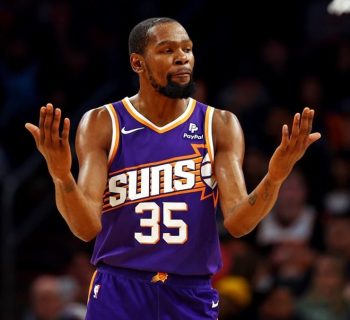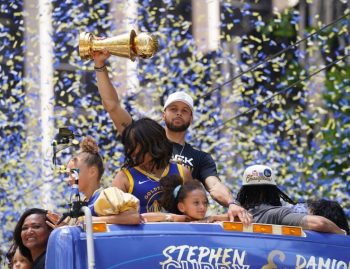NBA
NBA PM: The Evolution of Zach Randolph

The Evolution of Zach Randolph
Your team trails by 20 points entering the fourth quarter, but you refuse to stop watching. Despite having every reason to turn away, you tune in.
Occasionally, you’re rewarded.
In 2012, Chris Paul led his Los Angeles Clippers to a Game 1 victory despite trailing the Memphis Grizzlies by as many as 21 points in the fourth quarter. That was a treat.
Just a few weeks ago, with the New Orleans Pelicans fighting to avoid an 0-3 hole, Stephen Curry delivered a shot for the ages. It both fully erased a 17-point deficit in the game’s final minutes, as well as any chance the Pelicans had of winning the series. There, the basketball gods smiled upon us.
The moments are amazing to witness, but the slow evolution and maturation of a player with potential? There is no greater pleasure than seeing that progression.
An opportunity to see those moments—to serve as a witness—is why we watch.
And sometimes, in the rarest of instances, we are fortunate enough to see a player reinvent himself.
That’s exactly what Zach Randolph has done in recent seasons, becoming one of the contemporary NBA’s more overlooked contributors.
* * *
Drafted with the 19th overall pick from Michigan State University in 2001, the scouting report on Randolph was that he was a somewhat lazy volume shooter that had a chance to succeed with the right tutelage and leadership. Unfortunately, Rasheed Wallace and Bonzi Wells could not provide that for him.
Over the course of his first six years as a member of the Portland Trail Blazers, Randolph routinely got into altercations with teammates at practice, failed to win the affections of those around him and even found himself in problems with the law. The Blazers were all too happy when Isiah Thomas came knocking on the night of the 2007 draft, offering to take Randolph and the $60 million that would be due to him over the immediately proceeding four years.
In return for the human double-double, the Blazers received Channing Frye and the expiring contract of Steve Francis. It was the quintessential salary dump.
Randolph put up productive numbers as a member of the Knicks, but only solidified his reputation as a ball-stopping black hole that didn’t pay attention to, much less play, defense. With Donnie Walsh taking over from Thomas, one of the few executives who believed that Randolph could be a force upon whom championship aspirations could be built was ousted.
Hiring Mike D’Antoni was the proverbial nail in Randolph’s coffin. By this point in his career, he had been in the league for seven years and had never been a model player or citizen. He had never made an impact in the playoffs or sniffed an All-Star team and wasn’t viewed as anything more than a player with a low-post presence. It was no wonder that Walsh and D’Antoni secretly conspired to put winning secondary to building an offense around the skills of Randolph. The purpose? To inflate his statistical numbers so that the Knicks could dump him in a trade.
Those informed individuals in New York knew that bringing LeBron James to New York in July 2010 was Plan A. Randolph was a necessary causality in the war for the King’s services.
The Knicks were so desperate to get rid of Randolph that even after it was learned that Cuttino Mobley—one of the principle pieces received in exchange for Randolph from the Clippers—had what amounted to a career-ending heart condition (hypertrophic cardiomyopathy), the Knicks opted to consummate the trade anyway. They were that desperate to rid themselves of the power forward.
In Los Angeles, as a member of the Clippers, Randolph would last all of 39 games before being jettisoned, again, in a salary dump. The Clippers traded Randolph to the Memphis Grizzlies in exchange for Quentin Richardson.
Being traded for spare change broke Randolph’s spirit, but he became better because of it and was determined to turn around his career.
In Memphis, he became a new man and a new player.
* * *
It is 2015 and over the past six years, Randolph has gone from a player that nobody wanted to one that the Grizzlies have re-signed twice.
He has gone from a player that knew nothing more than how to put the ball in the basket to one who knows how to lead, galvanize and, most importantly, win.
Since his arrival in Memphis back in 2009, the Grizzlies have steadily grown into a consistent contender. Rudy Gay, O.J. Mayo, Greivis Vasquez, Darrell Arthur and Lionel Hollins among others have come and gone. Along the way, we have witnessed the growth of Mike Conley and Marc Gasol. We have seen Dave Joerger assume the mantle and behind it all, we have seen the Grizzlies grow into a legitimate contender.
Somewhere along the line, we just forgot to credit Randolph for his contributions toward that.
Smarter, wiser and more selfless, Randolph has evolved as a player and a person in Memphis and as his Grizzlies continue on in their quest to become one of the more improbable NBA champions in league history, he has emerged as the quintessential franchise player.
Over the course of this long season, Gasol’s emergence has dominated the conversation of pro basketball in Memphis. Conley’s ascension into the rank of first-class point guard has been missed by only a few. The midseason acquisition of Jeff Green and the rejuvenation of Beno Udrih were among the other storylines that emerged and effectively shrouded Randolph. For the most part, we have overlooked the fact that he, along with Gasol, has capably helped to man the interior on the both the offensive and defensive ends of the floor.
He has gone from being a ball stopper to a ball mover and, more impressively than anything else, has truly learned the importance of connecting with the fans, ownership and community around him. That the Grizzlies have decided to ride with Randolph until the wheels fall off is no coincidence: it’s common sense.
* * *
Some players enter the NBA with the know-how, mental fortitude, upbringing and nurturing necessary to step in from day one and lead. LeBron James and Anthony Davis are among them.
A great many others—a list that includes Kobe Bryant and Paul Pierce—learn on the job. And while his career accolades and accomplishments pale in comparison to each of those two, make no mistake about it, from a macro level, Randolph’s emergence as the cornerstone for this once lost and floundering franchise has been almost as impactful.
For years, the Grizzlies have quietly existed as one of the best kept secrets in the NBA, so it’s fitting that the burly southpaw, now a ripe 33 years old, remains one of the less talked about leaders in the game. He has come so far and has carried the Grizzlies with him.
Watch them play, see them fight, hear them roar.
It has taken a while, but Randolph has fulfilled the expectations placed upon him back in 2001.
Like Paul’s comeback and Curry’s shot, it’s a pleasure to witness. Watching Randolph battle and compete at the highest level— that wasn’t even fathomable to the Blazers, Knicks or Clippers when they decided to cut bait.
Growing up, second chances, defying odds and emerging as a leader? It’s Zach Randolph’s story, and it’s also why we watch.
Jimmy Butler Wins Most Improved Player
The NBA announced this afternoon that Chicago Bulls guard Jimmy Butler has won the 2014-15 Kia NBA Most Improved Player Award. Butler also earned his first All-Star selection and set career-highs in scoring, rebounding and assists this season, and now he becomes the first player to win the award with the Bulls.
The award is designed to honor an up-and-coming player who has made a dramatic improvement from the previous season or seasons. Butler, 25, received 92 of 129 first-place votes and 535 total points from a panel of sportswriters and broadcasters throughout the United States and Canada. Draymond Green of the Golden State Warriors (11 first-place votes, 200 points) and Rudy Gobert of the Utah Jazz (12 first-place votes, 189 points) finished second and third, respectively. Players were awarded five points for each first-place vote, three points for each second-place vote and one point for each third-place vote.
Butler, in his fourth NBA season, averaged 20 points (15th in the NBA), 5.8 rebounds, 3.3 assists and 1.75 steals (11th in the NBA) in a league-leading 38.7 minutes for a Chicago team that went 50-32 and secured the third seed in the Eastern Conference. He shot 46.2 percent from the field and 37.8 percent from three-point range. He also ranked seventh in the league in free throw attempts with 463 and converted a career-high 83.4 percent from the foul line in 65 games.
Last season, Butler averaged the same number of minutes and scored 13.1 points per game on 39.7 percent shooting from the field. His 6.9-point increase from 2013-14 to this season was the highest among all players who appeared in at least 40 games in each season, and his 6.5-percent improvement in field goal accuracy ranked second among players with at least 600 attempts in each season (Golden State’s Harrison Barnes improved by 8.3 percent).
To view each of the ballots and the complete voting breakdown, click here.













